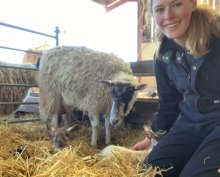
We love highlighting how our students develop their skills and attributes outside of the classroom and learning to make a difference to the world which they live in. Young farmer and aspiring vet, Lydia Franklin (Lower Sixth), has been fully involved throughout the whole lambing season this year at her family farm. We hope you enjoy reading her reflection below.
“Over the Easter Holidays I had the fantastic opportunity to help out with lambing again this year on our family farm. I got to spend much of my Easter holidays (between revision of course!) learning all about animal care and how much they depend on us.
“The lambing season can be any time between December and June; at our farm we have quite a late lambing as we usually hold an open day at Easter for people to see the lambs, although sadly not this year. It is also much more pleasant to be delivering lambs when it is 12 degrees rather than five!
“Lambing is a 24/7 job so the team works in shifts. There is a lot of waiting and watching, looking for signs of an ewe coming into labour. She often goes into a quiet space in the barn and starts bleating. She lies down, gets back up again and fidgets as she starts contracting. One distinct sign is stretching her head up and licking her lips, as by instinct an ewe licks her new born lambs clean. Many successful births happen without assistance, with two feet first and a head in between. However, if after about half an hour of the ewe contracting, nothing is showing, it’s likely she might need assistance.
“One of the most significant moments was when I delivered triplets on my own: Two lambs were coming at once and there was some difficulty, but in the end all three were safely delivered, up and bouncing very eagerly. What I find most rewarding is knowing that the farm has such a high level of commitment to animal welfare and how the needs of each ewe and lamb are met.”





















